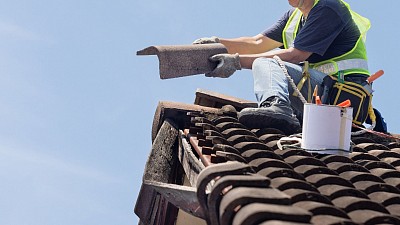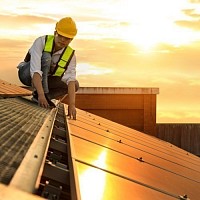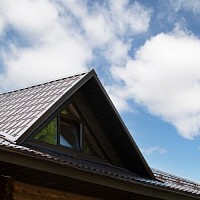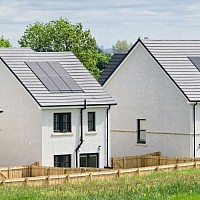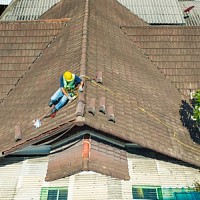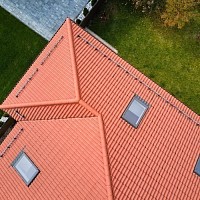Navigating the Considerations for Roof Replacement
When it comes to maintaining the structural integrity of a property, the roof plays a pivotal role in protection against the elements. Over time, every roof reaches a point where repair is no longer viable, and replacement becomes essential. A roof replacement company can offer comprehensive solutions to ensure your property remains secure and aesthetically pleasing. This article explores key considerations that property owners should keep in mind when contemplating roof replacement.
1. Recognizing Signs of Roof Deterioration
The first step toward addressing roofing concerns is recognizing when a roof has reached the end of its lifespan. Telltale signs of deterioration include missing, cracked, or curling shingles; leaks or water damage; and visible sagging. Regular inspections by homeowners can catch some of these issues early on, but for an extensive evaluation, a professional eye may be needed.
2. Understanding Different Roofing Materials
Selecting the right material is crucial for a successful roof replacement. Each material offers distinct benefits in terms of durability, cost-effectiveness, and aesthetic appeal. Common options include asphalt shingles known for their affordability and versatility, metal roofing which provides longevity and energy efficiency, and slate or tile offering lasting beauty with added resilience.
3. Considering Seasonal Timing
Timing your roof replacement can have implications on the project's efficiency and duration. Optimal weather conditions usually provide the best environment for roofing projects to be carried out effectively. While emergency replacements cannot wait, planning elective work during favorable weather seasons could facilitate smoother completion.
4. Evaluating Professional Roof Replacement Services
Choosing a reliable roof replacement company involves researching local service providers with proven track records in commercial roofing projects. It's important to select a company that adheres to safety standards while providing high-quality workmanship. Look for companies that offer additional services such as drone property inspection which utilizes advanced technology to assess your roofing needs accurately.
5. Inspecting After Severe Weather Events
In areas prone to harsh weather conditions like storms or hail, roofs often sustain damage that may not be immediately apparent from ground level. Free storm damage inspections provided by knowledgeable contractors can help identify hidden issues before they exacerbate over time leading to more significant problems.
6. Considering Warranties and Guarantees
When undertaking such an investment as replacing your roof, you'll want assurances about the quality of both materials used and labor provided. Reliable contractors will offer warranties on their work as well as guarantees on materials supplied by manufacturers – factors worth considering during contractor selection.
7. Planning Financially for Your Roof Replacement
Financial planning for a new roof requires careful budget consideration due to varying costs associated with different materials and labor involved in installation processes—seek quotations from multiple contractors before making decisions about your investment into this critical aspect of building maintenance.
8. Emphasizing Energy Efficiency Benefits
Energy-efficient roofing systems are becoming increasingly popular choices among property owners looking not only to protect their assets but also reduce their environmental impact—and potentially save on utility bills through improved heat retention during colder months or reflective properties that keep buildings cooler in summer heat.
9. Acknowledging Long-term Property Value Enhancement
Investing in high-quality roofing doesn't just solve immediate problems—it also adds long-term value to your property by improving overall aesthetics while ensuring future buyers that they won't need immediate repairs after purchase—a valuable selling point which should be factored into decision-making processes regarding whether now is indeed right time replace one’s current system entirely rather than attempting further repairs existing structure might require instead.
10. Partnering with Local Experts
Collaborating closely with local experts who understand specific regional challenges can make all difference when comes selecting optimal solutions suited particular climate demands—as well leveraging insights gained through years experience working within community itself thus ensuring more personalized approach taken towards meeting individual client needs effectively efficiently possible manner available today’s ever-evolving marketplace offerings alike.
In summary, approaching roof replacement involves meticulous assessment coupled with strategic planning alongside partnering up with seasoned professionals who bring expertise tailored specifically toward unique requirements each project presents itself having mind end goal always being protection enhancement one’s most valuable asset—their home business facility alike—through provision top-tier services industry-renowned reliability across board alike ensuring peace mind every step way process unfolds form start finish without fail each every time around no exceptions rule whatsoever period full stop end story once all said done matter hand conclusion ultimately reached final analysis thereof accordingly indeed yes sir ma'am thank you very much good day evening night whenever happens reading this sentence right now moment current juncture chronological sequence events
Embracing Innovation in Roofing: Drones and Damage Inspections
The roofing industry is continuously evolving, with new technologies and methods enhancing the way roofing contractors conduct business. From commercial buildings to residential homes, the need for efficient and reliable roofing services is paramount. This article will discuss how innovation, specifically drone technology and comprehensive damage inspections, is transforming the roofing industry.
1. Advancements in Commercial Roofing:
Commercial roofing has seen significant advancements in materials and techniques, leading to more durable and energy-efficient solutions. Contractors now have access to a variety of materials that cater to different climates and building designs. Reflective coatings, single-ply membranes, and modified bitumen are just a few examples of the innovations improving commercial roofs' lifespan and performance.
2. The Role of Drone Technology:
Drone property inspection represents a leap forward in how roofing contractors evaluate roofs. By using drones equipped with high-definition cameras, contractors can safely and quickly inspect roofs without the need for ladders or scaffolding. This not only speeds up the inspection process but also enhances safety by reducing the risk of falls. High-resolution images captured by drones provide detailed views of roof conditions, allowing for accurate assessments without direct contact.
3. Comprehensive Free Storm Damage Inspections:
In areas prone to severe weather conditions, storm damage can be a significant concern for property owners. Offering free storm damage inspections allows roofing contractors to identify issues promptly, enabling timely repairs that prevent further damage. A thorough inspection covers all aspects of potential harm from wind, hail, or debris impacts—ensuring property owners are fully informed about their roof's condition following adverse weather events.
4. Importance of Timely Roof Maintenance:
Regular maintenance is critical to extending a roof's lifespan and ensuring its effectiveness in protecting a building from the elements. Routine inspections help detect minor problems before they escalate into major issues requiring costly repairs or even full replacements. Proactive maintenance keeps roofs in optimal condition while providing peace of mind to property owners.
5. Choosing a Contractor for Roof Replacement:
When it comes time for roof replacement near your location, selecting the right contractor who understands your specific needs is vital for success. Property owners should look for experienced professionals who offer comprehensive services—from initial inspections to final installations—and utilize advanced technologies like drone inspections to ensure precise workmanship.
Navigating Roof Replacement: What Property Owners Should Consider
When property owners face the task of replacing a roof, it's essential to approach the project with care and due diligence. A roof replacement is not just about enhancing the aesthetic appeal of a building; it's also a crucial investment in protecting the structure from environmental elements. This article explores key considerations for property owners looking to hire a roof replacement contractor, focusing on services that contribute to the longevity and reliability of their roofing systems.
1. Understanding the Scope of Roof Replacement
A thorough assessment by a seasoned roof replacement contractor can determine whether minor repairs will suffice or if a complete overhaul is necessary. Factors such as age, weather damage, and material wear and tear play into this decision. The scope may vary from simple shingle replacement to an extensive substrate repair, insulation update, or ventilation improvement.
2. Choosing Suitable Materials
The selection of roofing materials impacts not only aesthetics but also functionality and durability. Commercial property owners should work with contractors to understand options like asphalt shingles, metal roofing, or flat roof systems. Material choice should reflect climate conditions, building design, and budgetary constraints while ensuring high-quality protection.
3. Considering Advanced Inspection Techniques
Innovative technologies like drone property inspection offer detailed views of hard-to-reach areas without risking worker safety or causing additional damage to the property. Utilizing such advanced techniques can help identify issues early on and provide accurate insights for a comprehensive repair plan.
4. Evaluating Contractor Credentials
When selecting a roof replacement contractor, it's critical to review their credentials thoroughly. Ensure they are licensed, insured, and have experience in commercial roofing projects similar in scale and complexity to your own. Check references and reviews from previous clients to gauge their reliability and workmanship quality.
5. Addressing Storm Damage Proactively
Areas prone to harsh weather conditions require special attention when it comes to roofing solutions. Free storm damage inspections conducted by knowledgeable contractors can assess potential vulnerabilities before they lead to significant issues. Early detection followed by prompt repairs can extend the life span of your roof substantially.
6. Planning for Disruption Minimization
Roof replacements on commercial properties must be managed strategically to minimize disruptions to daily operations. A well-organized contractor will develop a timeline that accommodates business hours and other logistical considerations while maintaining workplace safety during construction activities.
7. Understanding Warranty Options
A new roof is an investment that should be protected through comprehensive warranty options covering materials and workmanship quality. Discuss these provisions with your contractor so you have peace of mind knowing that future issues will be addressed under warranty terms if they arise.
8. Emphasizing Communication Throughout the Process
Clear communication with your roofing contractor is vital from initial consultation through project completion. Expect regular updates regarding progress, any challenges encountered along the way, and changes that might affect timelines or costs.
9. Considering Long-Term Maintenance Plans
Post-installation maintenance plans are essential for preserving your new roof's integrity over time. Regular inspections by professionals can detect minor issues before they escalate into costly repairs—maintaining your investment for years to come.
10. Aligning Project Goals with Budget Constraints
Finally, balancing project objectives with financial limitations requires open dialogue between property owners and contractors . Discuss financing options, potential cost-saving measures without compromising on quality ,and strategies for getting the most value out of your new roofing system .
In conclusion, embarking on a roof replacement journey necessitates careful planning, informed decision-making ,and partnership with an experienced roofer who understands commercial needs . By considering these ten points ,property owners can ensure that their investment yields robust protection against elements while aligning perfectly with their operational requirements.
Navigating the Process of Roof Replacement for Commercial Properties
Making the decision to replace a roof on a commercial property is not one that should be taken lightly. It involves considerable planning, investment, and coordination to ensure the new roof meets both practical needs and industry standards. Roof replacement can often feel overwhelming, but understanding the process can alleviate much of the stress involved. This article will outline several key steps that business owners and property managers should consider when embarking on a roof replacement project.
1. Evaluate the Current Roofing System
The first step in any roof replacement process is to thoroughly evaluate the current roofing system's condition. This often begins with a visual inspection to identify signs of wear and tear such as cracked or missing shingles, sagging areas, or water damage. For more advanced assessments, services like drone property inspections offer a high-tech solution that can provide detailed images of hard-to-reach places, allowing you to assess damage without risking personnel safety.
2. Consider Your Roofing Options
Once an evaluation has been completed, it's crucial to research various roofing materials and options suitable for your commercial property. Different materials offer varying levels of durability, energy efficiency, and aesthetic appeal. Popular choices for commercial buildings include metal roofing systems for their longevity and energy efficiency; single-ply systems like TPO (thermoplastic polyolefin) or EPDM (ethylene propylene diene terpolymer) for flat roofs; and modified bitumen or built-up roofing systems for their ruggedness against foot traffic.
3. Get a Professional Inspection
Professional inspections by qualified contractors are invaluable in determining whether a complete roof replacement is necessary or if repairs could suffice. Contractors who provide free storm damage inspection services can identify issues stemming from severe weather events which might not be immediately obvious to untrained eyes. Their insights are essential in deciding whether to repair or replace your roofing system as they understand how even minor damages today can lead to major problems down the line if left unaddressed.
4. Selecting a Reliable Contractor
Choosing a reliable contractor is perhaps the most critical aspect of undergoing a roof replacement project. The contractor you select should have experience with commercial roofing projects similar in scope and complexity to yours. They must possess all necessary licenses and insurance coverages required by local regulations so that you're protected throughout the entire process.
5. Understand Timeframes and Disruptions
A significant consideration during roof replacement is time management—both in terms of how long the project will take from start to finish as well as what disruptions it may cause daily operations at your facility. Experienced contractors will work with you to develop a timeline that minimizes impact on your business while still allowing them enough time to deliver quality workmanship.
6. Budget Planning
Budget planning goes hand-in-hand with selecting materials and contractors—it's important not only to have an estimate of upfront costs but also an understanding of long-term savings provided by different roofing solutions available in terms of maintenance requirements and energy efficiency gains.
7. Post-Replacement Maintenance
After your new roof has been installed, setting up regular maintenance checks ensures longevity for your investment. Scheduling routine inspections helps catch potential issues early before they become expensive problems down the road.
Embracing Modern Solutions in Roofing for Commercial Properties
The importance of a sturdy and reliable roof over one's head is paramount, especially when it comes to commercial properties. A solid roofing structure not only protects assets from the elements but also significantly impacts the aesthetic appeal and value of a property. In the ever-evolving construction industry, commercial entities are increasingly turning toward modern solutions like drone property inspections and proactive storm damage assessments to ensure their investments remain secure. Below are key considerations that detail how these innovative services are reshaping the approach to commercial roofing.
1. The Rise of Drone Technology
In recent years, drone technology has revolutionized property inspections, particularly for expansive commercial roofing systems. Drones offer an unparalleled vantage point, allowing for comprehensive assessments without the risks associated with traditional manual inspections. By utilizing this cutting-edge tool, roofing professionals can identify potential issues with precision and efficiency, capturing detailed images that highlight areas in need of attention. This level of thoroughness ensures that every inch of the roof is scrutinized accurately, leading to informed decisions about maintenance or replacement needs.
2. Navigating Storm Damage Proactively
Storms can strike unexpectedly and inflict severe damage on roofing structures. That's why a free storm damage inspection service is invaluable for commercial property owners looking to mitigate risks proactively. After adverse weather events, it's crucial to assess any inflicted damage swiftly to prevent further deterioration or interior harm to the property. Qualified inspectors can evaluate the extent of storm impact and recommend necessary repairs or replacements promptly, thereby safeguarding against potential operational disruptions or financial losses due to unaddressed damage.
3. The Decision for Roof Replacement
There comes a time when repair is no longer a viable option for preserving the integrity of a roofing system – that's when considering a roof replacement company becomes essential. Selecting a service provider with comprehensive knowledge in replacing roofs on commercial buildings is critical since these projects require meticulous planning and execution. A proper assessment will determine whether replacing an aging or damaged roof will be more cost-effective long-term than ongoing repairs.
4. Custom Solutions for Diverse Commercial Needs
Commercial roofs come in various shapes and sizes, each with unique requirements regarding materials and design specifications. A professional roofing service must have the capability to provide custom solutions tailored to address specific needs effectively—whether flat roofs typical in urban landscapes or sloped designs seen in suburban business parks.
5. Commitment to Quality Service
Quality service goes beyond mere installation; it encompasses every interaction from initial consultation through project completion and follow-up support. It includes clear communication about processes, timelines, costs involved, as well as responsiveness to client inquiries throughout the duration of the project.
The Importance of Timely Roof Replacement for Commercial Properties
The roof of any commercial building plays a pivotal role in protecting the structure and its contents from the elements. Over time, even the sturdiest roofs can succumb to wear and tear, leading to the need for a roof replacement. In this post, we will discuss why timely roof replacement is critical for maintaining the integrity of commercial properties.
1. Preventing Water Damage:
A compromised roof can lead to water infiltration, which can cause extensive damage to a building's interior structures and valuable equipment. Regular inspections, particularly after severe weather events, can detect issues early on and prompt necessary actions like roof replacement before minor damage escalates into major problems.
2. Enhancing Energy Efficiency:
An older roof may not provide adequate insulation compared to newer materials available today. Replacing an outdated roof with modern, energy-efficient materials can significantly reduce heating and cooling costs for commercial properties by maintaining a consistent indoor temperature and reducing strain on HVAC systems.
3. Improving Safety:
A deteriorating roof poses safety risks such as collapses or falling debris that could injure occupants or passersby. A timely replacement ensures that your property remains safe for everyone while also mitigating potential liability issues arising from accidents related to structural failures.
4. Maintaining Property Value:
The condition of a property's roof is a key factor in its overall value. A well-maintained or recently replaced roof can enhance curb appeal and signal to potential buyers or tenants that the property is well cared for, potentially increasing its market value.
5. Complying with Building Codes:
Building codes evolve over time, often becoming more stringent in terms of materials and construction standards. Engaging in regular updates like a full-scale roof replacement ensures compliance with current codes, which is essential for legal operation and insurance purposes.
Navigating Commercial Roofing Challenges with Expertise
In the contemporary business landscape, commercial property owners face a myriad of challenges when it comes to maintaining and protecting their investments. One of the most critical aspects of this maintenance is ensuring the integrity and longevity of the building's roofing system. A robust and well-maintained roof is pivotal for safeguarding the property against environmental elements and preserving its value. Here we explore the essential considerations when dealing with commercial roofing systems, emphasizing the importance of contracting proficient roof replacement contractors.
1. Understanding Commercial Roofing Complexities
Commercial roofs are inherently different from residential ones due to their size, design, and materials used. These structures often require specialized knowledge for installation, repair, or replacement. A proficient roof replacement contractor will understand these complexities and provide solutions tailored to each unique situation. They are adept at handling various roofing materials such as modified bitumen, EPDM rubber, TPO (thermoplastic olefin), PVC (polyvinyl chloride), and metal roofing systems which are common in commercial applications.
2. Embracing Innovative Inspection Techniques
With advancements in technology, innovative inspection methods have revolutionized how contractors evaluate roofing conditions. Drone property inspections are one such innovation that offers a non-invasive way to assess damage accurately. Drones equipped with high-resolution cameras can safely survey a roof's surface to identify issues like cracks, blisters, or water pooling without risking personnel or further damaging the structure.
3. Proactive Approach with Free Storm Damage Inspections
Adverse weather conditions pose one of the greatest threats to commercial roofs. Hailstorms, heavy rainfalls, strong winds can all inflict significant damage that may not be immediately apparent but can worsen over time if left unchecked. Offering free storm damage inspections exemplifies a proactive approach by a contractor dedicated to ensuring clients' properties remain secure and intact after inclement weather events.
4. The Importance of Timely Intervention
Delaying roof repairs or replacement can lead to more extensive problems down the line - from minor leaks that affect insulation and interior structures to major breaches that compromise building safety and operations continuity. An experienced roof replacement contractor will emphasize timely intervention upon detecting any signs of wear or damage during routine inspections or after specific events that may compromise the roof's integrity.
5. Custom Solutions for Each Client
Every commercial building has its own set of requirements based on its design, location, use case, and industry-specific regulations – factors which demand custom-tailored solutions from your roofing partner. Experienced contractors take into account all these facets when suggesting maintenance schedules, repair strategies or full-fledged replacements; ensuring each client receives an optimal solution for their particular needs.
6. Coordination with Business Operations
Replacing a commercial roof should not interfere drastically with everyday business operations whenever possible. Expert contractors will coordinate closely with property owners/managers to devise a work schedule that minimizes disruptions while still completing the project efficiently.
7.Sustainability Considerations
Sustainable practices in roofing concern not only material selection but also disposal methods for old materials removed from site during replacement projects plus energy efficiency considerations for new installations – factors which competent contractors will navigate carefully in line with client values and regulatory demands.
8.Long-Term Partnership Potential
Establishing relationships based on trust where regular maintenance is managed proactively by your trusted contractor helps prevent emergencies while maintaining overall cost effectiveness through longevity enhancements brought about by consistent care over time.
9.Qualifications and Credentials
Lastly but crucially important are qualifications held by prospective contractors; proper licensing credentials along with industry certifications bear testament to their expertise enabling them deliver services up-to-par standards expected within this sector.
Choosing an adept roof replacement contractor hence becomes key not only in resolving current issues effectively but also preventing future complications through expert craftsmanship aligned closely alongside technological advancements within this field today’s dynamic business environment calls for nothing less than excellence when it comes to protecting your commercial property’s rooftop investment – make sure you choose wisely!
Navigating the Process of Roof Replacement for Commercial Properties
Roof replacement for commercial properties is a substantial investment and a critical component in maintaining the integrity of a building. It's not just about removing old shingles and laying new ones; it's a complex process that requires meticulous planning, execution, and follow-up. This article aims to guide property owners through the key steps involved in replacing a commercial roof, ensuring informed decisions are made throughout the journey.
1. Conducting Initial Assessments
The first step in any roof replacement project is to conduct a thorough assessment of the existing roof's condition. This involves checking for signs of wear and tear, such as cracks, leaks, or missing materials that might indicate underlying structural issues. A detailed inspection can help determine whether a repair will suffice or if full replacement is necessary.
2. Choosing Quality Materials
Selecting appropriate roofing materials is crucial for durability and protection against environmental factors. The choices range from traditional asphalt shingles to metal roofing, each with its own benefits in terms of lifespan, energy efficiency, and aesthetic appeal. It’s important to consider local climate conditions, building codes, and budget when deciding on materials.
3. Partnering with Professionals
Partnering with experienced roofing professionals can make all the difference between a seamless process and one fraught with challenges. Look for contractors who specialize in commercial roofing as they will understand the complexities involved, including adherence to safety standards and regulations specific to commercial buildings.
4. Implementing Drone Property Inspection
Innovations like drone property inspection have transformed how assessments are conducted before embarking on roof replacement projects. Drones provide an aerial perspective that offers comprehensive views of hard-to-reach areas without risking worker safety or causing further damage to weakened structures.
5. Managing Project Logistics
Roof replacement on commercial properties often involves significant logistical considerations due to their size and operational needs. Ensuring minimal disruption to daily business activities requires strategic scheduling and clear communication with stakeholders throughout the project duration.
6. Addressing Storm Damage Proactively
Storms can cause extensive damage that may necessitate immediate roof replacement. Utilizing services such as free storm damage inspections can help identify issues promptly, enabling swift action before minor damages escalate into major concerns requiring more costly interventions.
7. Aligning with Environmental Standards
Today's property owners are increasingly conscious of their environmental footprint making sustainable practices an essential aspect of roof replacements. Options like cool roofs or green roofing systems not only promote energy efficiency but also align with green building standards contributing positively to environmental sustainability efforts.
8. Maintaining Open Communication Lines
Throughout every stage of the process—from initial inspection through completion—maintaining open lines of communication among all parties involved ensures transparency and accountability.
9.Ensuring Post-Installation Follow-up
After installation is complete regular maintenance checks should be scheduled to extend the life span of your new roof These check-ups allow early detection potential problems helping avoid expensive repairs down line
10 Considering Warranty Options
Finally exploring warranty options offered by both material manufacturers installers provides additional security peace mind Knowing your investment protected gives confidence long-term performance newly installed system
In conclusion effective management comprehensive understanding key components essential successful execution commercial roof replacements By taking these steps diligently owners ensure their properties remain safe functional aesthetically pleasing years come


